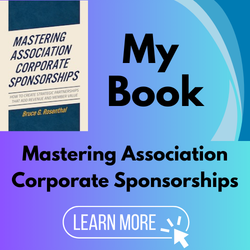Kicking Off Q3 2024: Avoid Costly Mistakes — Understand How Your Corporate Sponsors Make Decisions
July 2024
Failing to know how your corporate supporters make funding decisions can be a costly mistake for associations. Here are six examples:
1. Renewing Sponsorships Too Late: An association’s policy mandates that sponsorships align with the association’s fiscal year, ending on September 30th. In July, the Director of Sponsorships reaches out to a corporate sponsor regarding a renewal. The corporate executive responds, “Sorry, we set our budget in May for our company’s upcoming fiscal year that begins on July 1.”
2. Reduced Support Due to Timing: The association’s Vice President of Corporate Partnerships reaches out to a corporate partner in October regarding renewing their calendar-year support. The corporate executive replies, “Sorry, when we worked on our marketing budget last month, we decided to reduce our sponsorship of your association by $20,000.”
3. Late Conference Sponsorship Requests: The association’s Director of Conferences contacts a company about sponsoring the association’s Annual Meeting, which is four months away. The corporate executive responds, “Sorry, we usually book our conference support and travel six months in advance.”
4. Repeated Requests Leading to Flat Budgets: The association’s CEO calls a long-time corporate supporter to ask if the company will increase its support. The corporate executive replies, “We’d like to increase our support, however, your staff comes to us five times a year with different sponsorship and exhibiting requests. Since I don’t know the opportunities in advance, I just budget the same support amount each year.”
5. Assuming Existing Sponsors will not Want to Hear about New Initiatives: Assuming your existing sponsors are only interested in renewing current commitments can lead to missed opportunities for additional support.
6. Unclear Value Proposition: Due to lack of turnaround time internally, an association sends a generic sponsorship proposal, highlighting basic benefits like logo placements and event registrations. A corporate executive responds, “We need a clearer understanding of how this sponsorship will directly benefit our company’s strategic goals. Without that, we can’t justify the investment.”
Tips to Avoid Losing Corporate Support Due to Bad Timing:
1. Understand Decision Timelines: Know when your corporate supporters make decisions to support associations. Ask about their budget decision timelines, not just their fiscal year. Knowing a company’s fiscal year can be misleading because some companies start working on budgets one, two, or even three months before the new fiscal year begins.
2. Ask Post-Conference: At the end of your association’s conferences, ask conference sponsors when they would like to be contacted about future conference sponsorship opportunities. They might prefer to be contacted when they do their annual budget or a certain number of months before the conference.
3. Align with Budgeting Timetables: During exploratory calls with prospective sponsors, ask when they would like to review a sponsorship proposal based on their budgeting timetable.
4. Create a Sponsorship Outreach Calendar: Develop a calendar that aligns your outreach and keeps you on task. This helps ensure you follow through on contacts with each corporate sponsor at the most opportune times.
5. Regular Check-ins: Schedule regular check-ins with your corporate sponsors to stay informed about any changes in their budgeting process or timelines. This can help you adjust your approach and timing accordingly. Also, proactively sharing new initiatives as they emerge with existing sponsors can spark fresh interest and lead to expanded sponsorships.
6. Tailor Your Approach: Take the time to customize your sponsorship proposals to fit the specific timing and needs of each corporate sponsor. This demonstrates that you understand their processes and respect their timelines, increasing the likelihood of securing support.
By understanding and aligning with your corporate supporters’ funding timelines, you can improve your chances of securing and even increasing their support.
About the Authors
Combining their extensive years of experience in corporate support and corporate partnership, Lori Zoss Kraska, MBA, CFRE and Bruce Rosenthal have come together to share insights and best practices with a series of Quarterly Engagement Action Items.
Lori is the founder of Growth Owl, LLC, author of The Boardroom Playbook and creator of Growth Owl Academy, online corporate sponsorship training. Before starting Growth Owl, LLC, Lori held leadership positions within public media, commercial media, and purpose driven organizations responsible for corporate sponsorship.
Bruce Rosenthal is the founder of Bruce Rosenthal Associates, LLC, co-convener of the Partnership Professionals Network, and author of articles on corporate sponsorship programs. Before starting Bruce Rosenthal Associates, LLC, Bruce held senior-level positions for various national associations, including Vice President of Corporate Partnerships.
Both Lori and Bruce are regularly invited on the speaker circuit and featured in various webinars, presentations, and podcasts about corporate partnership and support.

